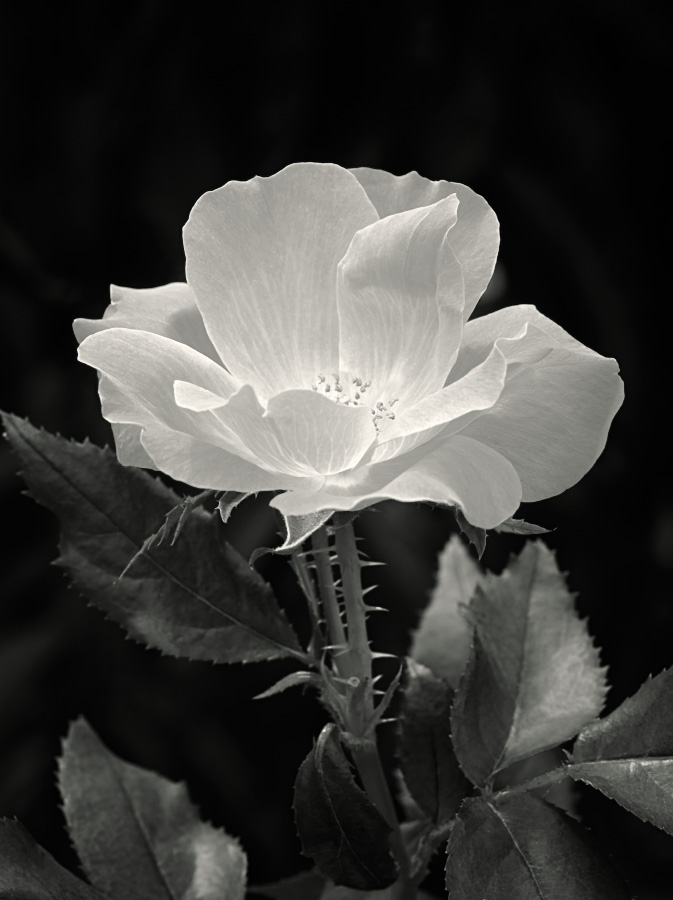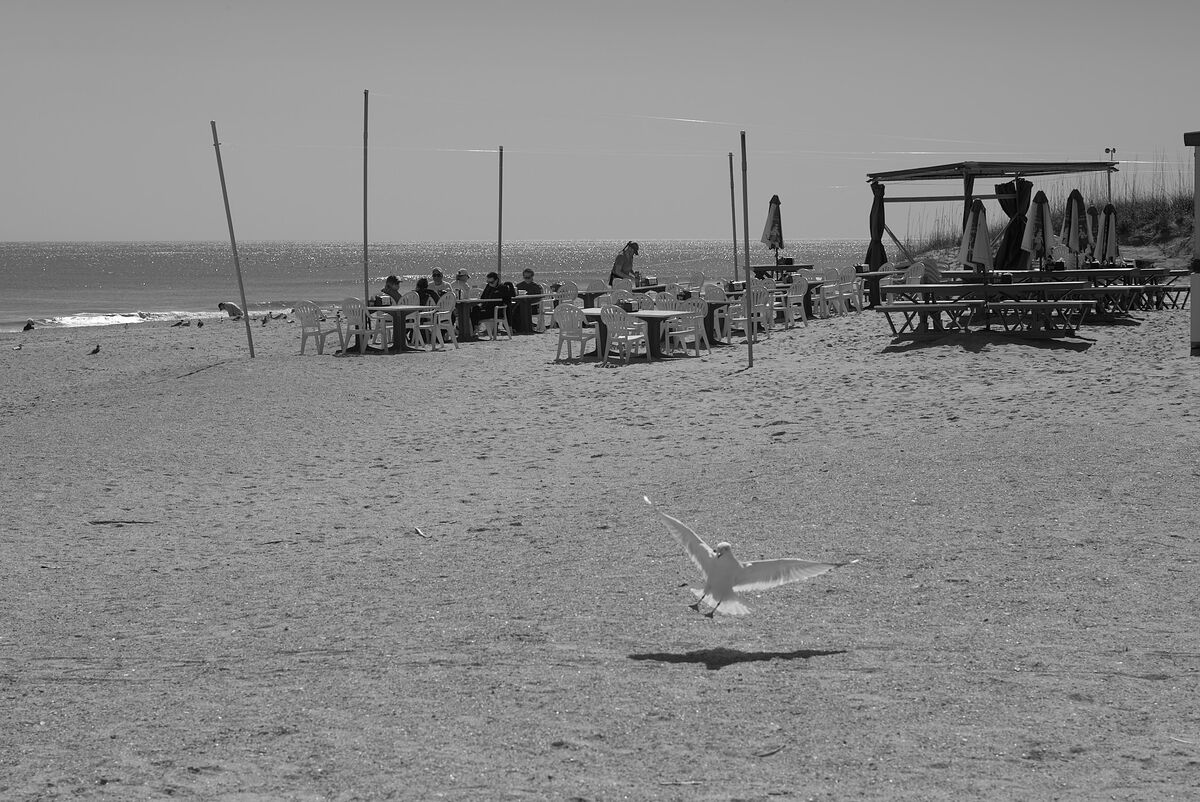Shooting B&W with digital camera
Aug 25, 2022 17:26:11 #
Rongn..., The film filter coupled to a digital camera then processed in ACR works pretty well. Thanks again for bringing that topic to light.
This deserves a bit more in-depth experimentation.
Additionally, it might be of some usefulness in my attempts to emulate the dye transfer process digitally. Yeah, I'm still working on that one from time to time.
--Bob
This deserves a bit more in-depth experimentation.
Additionally, it might be of some usefulness in my attempts to emulate the dye transfer process digitally. Yeah, I'm still working on that one from time to time.
--Bob
Rongnongno wrote:
What I am about to say is going to create a contro... (show quote)
Aug 25, 2022 17:52:01 #
rmalarz wrote:
The film filter coupled to a digital camera then processed in ACR works pretty well.
Damned with faint praise - "pretty well".
It certainly does not work the same as it does with B&W film. Film has a different response to color and not all films respond the same to differences in wavelengths - orthochromatic, ortho-panchromatic, panchromatic, etc.
And certainly you won't be able to find a filter that removes blue and cyan the way you like to do with so many of your cloud scenes to make the clear blue sky turn black.
Aug 25, 2022 17:55:14 #
dkeysser wrote:
OR, I am very interested in your comment on having a converted Sony camera. I assume you somehow converted it into B&W only? Can you explain this in more detail? I have several Sony bodies, and I would be very happy to convert one of them to B&W only. How did you do this? Thanks.
Take a look at Monochrome Imaging Services. That's where I had my A7 II converted a couple of years ago and I can recommend them.
Aug 25, 2022 17:58:53 #
"pretty well" was my impression after one button click and viewing the results with no additional processing. That was just to see what kind of starting point I get.
I always enjoy the naysayer's involvement with this group and the opportunity to prove them wrong from time to time.
--Bob
I always enjoy the naysayer's involvement with this group and the opportunity to prove them wrong from time to time.
--Bob
selmslie wrote:
Damned with faint praise - "pretty well".
It certainly does not work the same as it does with B&W film. Film has a different response to color and not all films respond the same to differences in wavelengths - orthochromatic, ortho-panchromatic, panchromatic, etc.
And certainly you won't be able to find a filter that removes blue and cyan the way you like to do with so many of your cloud scenes to make the clear blue sky turn black.
It certainly does not work the same as it does with B&W film. Film has a different response to color and not all films respond the same to differences in wavelengths - orthochromatic, ortho-panchromatic, panchromatic, etc.
And certainly you won't be able to find a filter that removes blue and cyan the way you like to do with so many of your cloud scenes to make the clear blue sky turn black.
Aug 25, 2022 18:09:06 #
bluezzzzz wrote:
Mike Johnston, at TheOnlinePhotographer.com, has b... (show quote)
Thanks for the link.
I have actually not found a problem with any of the gripes he listed:
Soot-and-chalk - Has not happened. I find the tonality completely natural.
Too sharp - Well, that's part of the reason to convert, to eliminate the demosaicing step. I can get the same sharpness from my 24MP monochrome sensor as I can from my 45.7MP Z7 using the same lens.
Depressed mid-tones - Doesn't happen. He may be using a preset that is giving him the wrong curve and that may also account for his soot-and-chalk gripe.
Hyped-up local contrast - Ditto, and it's also not happening in my images.
I use Monochrome2DNG to avoid the unnecessary demosaicing step and I develop my images in Capture One Pro. I often do no processing other than dust removal.
Aug 25, 2022 18:18:39 #
Aug 25, 2022 18:24:05 #
frankie c wrote:
the picture you are showing me is in a color profile not a B&W profile. I give up. You are a photography genius. I quit, I don't know what I was thinking.
Frankie or others, what do you think about the Leica B/W digital camera that costs a fortune? Would that be far superior to the methods above for using color sensors and converting the results? In theory, the same full frame sensor size devoted to only two colors is supposed to be like a much bigger sensor in results?
https://www.crutchfield.com/S-cVxQNCSUOqr/p_91020200/Leica-M11-no-lens-included-Black.html?XVINQ=GLX&awkw=1594374966446&awat=pla&awnw=s&awcr=574759154868&awdv=c&awug=9014657&gclid=EAIaIQobChMIqP222IPj-QIVtBNMCh2TrArgEAQYAyABEgJEKfD_BwE
Aug 25, 2022 18:35:15 #
If I could afford that Leica, I'd get one. Instead, I'll stick with the Leica I have. It does pretty nice black and white photos.
--Bob
--Bob
Charles 46277 wrote:
Frankie or others, what do you think about the Lei... (show quote)
Aug 25, 2022 18:39:16 #
Artcameraman
Loc: Springfield NH
have your camera converted to 850nm in frared, it will blow your mind. Also JPEG, no no no!
Aug 25, 2022 18:47:52 #
+1 for the early recommendation to shoot in color and convert via Nik’s Silver Efex. Another, even better option IMHO, is shooting in color then using the Exposure X7 photo editor, which includes over 100 various black and white film emulation presets having incredibly accurate tonal and grain characteristics. All the classic B&W films (and even more color, but your question focused on B&W). Free 30 day trial; can’t go wrong.
Aug 25, 2022 19:05:28 #
The forum now has a B&W section. May give you some hints/ideas. Could also get some useful info from members that post there dkeysser.
Don
Don
Aug 25, 2022 19:07:52 #
For anyone interested, it looks like the Flickr Explore gallery is all B&W for 24Aug2022:
https://www.flickr.com/explore/2022/08/24
And another article from TOP, where he really gets into the weeds of his B&W quest. One commenter asks if it is really worth $1200 to get the camera conversion. Good question.
https://theonlinephotographer.typepad.com/the_online_photographer/2022/08/update-on-the-great-monochrome-safari.html
Marshall
https://www.flickr.com/explore/2022/08/24
And another article from TOP, where he really gets into the weeds of his B&W quest. One commenter asks if it is really worth $1200 to get the camera conversion. Good question.
https://theonlinephotographer.typepad.com/the_online_photographer/2022/08/update-on-the-great-monochrome-safari.html
Marshall
Aug 25, 2022 19:23:43 #
osoblancophoto
Loc: Venice FL
joecichjr wrote:
A first-rate, phenomenally beautiful composition 🖤🖤🖤🖤🖤
Thanks Joe, This one is in Iceland.
Aug 25, 2022 19:53:58 #
Ysarex
Loc: St. Louis
Charles 46277 wrote:
Frankie or others, what do you think about the Lei... (show quote)
You're referring to the Leica Monochrom: https://leica-camera.com/en-US/photography/cameras/m/m10-monochrom or the Monochrom version of the Leica Q. They're interesting cameras with no color filter array over the sensor. You can also purchase other brand cameras that have the color filter array removed or have the color filter array removed from your own camera as Scotty here has done with his Sony.
What you get is a bit of a boost in sensitivity as the CFA no longer blocks some light, but much more importantly you gain in resolution because it's no longer necessary to demosaic the CFA. No matter how you cut it there's some loss involved in the demosaicing process with a camera that has an RGB filter array in front of the sensor. The monochrome sensor camera avoids that loss and you get very fine detailed high-res images.
What you lose is the ability to better control the translation of color to tone. You're basically back with a B&W film camera and color filters over the lens to control how color translates to tone. The classic example is a photo of a red rose and green leaves. The un-filtered B&W image will render the tone of the rose and leaves as similar and the photo is mush. With a B&W film camera or monochrome digital camera you could place a red filter over the lens and it will lighten the red rose. I've done the same in the photo below in digital post. But with the B&W film/monochrome digital camera the red filter will also turn the green leaves very dark -- nearly black. I have not done that in the photo below. I had that choice working with a digital (color) camera. You would not have that choice with the Leica Monochrom -- you get black leaves.
For me that added post processing flexibility trumps the added detail and resolution so I prefer to take B&W photos using a digital camera with a CFA but other folks have their own priorities and the Leica Monochrom does sell as a special purpose item.

Aug 25, 2022 20:10:41 #
That's an interesting perspective. I have been debating converting one of my Sonys into a monochrom. But today I did an extensive series of tests with my Sony RX1Rii using different settings for the Creative Style B&W and the Picture style rich-tone mono, changing the contrast settings and the exposure compensation. I will review those tonight. Since I photograph mostly in color, I am reluctant to sacrifice one of my camera bodies, or buy a monochrom, just for those infrequent occassions when I prefer B&W over color. Thanks.
If you want to reply, then register here. Registration is free and your account is created instantly, so you can post right away.






